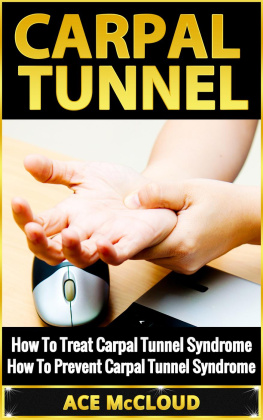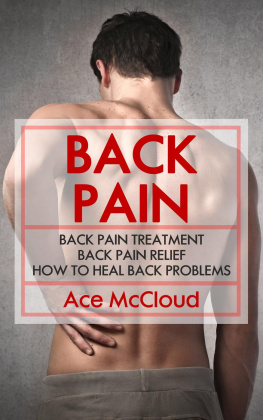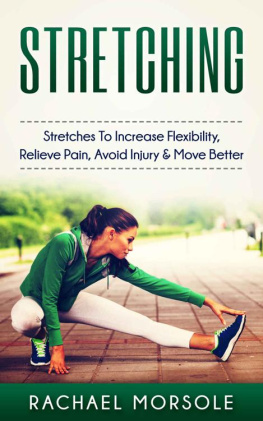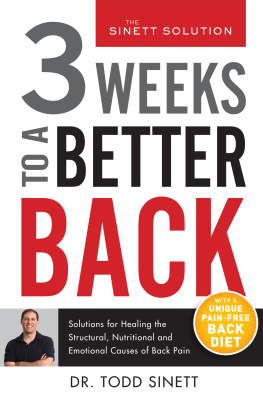Hip Pain
Treating Hip Pain
Preventing Hip Pain
All Natural Remedies For Hip Pain
Medical Cures For Hip Pain
Along With Exercises And Rehab For Hip Pain Relief
By Ace McCloud
Copyright 2014
Disclaimer
The information provided in this book is designed to provide helpful information on the subjects discussed. This book is not meant to be used, nor should it be used, to diagnose or treat any medical condition. For diagnosis or treatment of any medical problem, consult your own physician. The publisher and author are not responsible for any specific health or allergy needs that may require medical supervision and are not liable for any damages or negative consequences from any treatment, action, application or preparation, to any person reading or following the information in this book. Any references included are provided for informational purposes only. Readers should be aware that any websites or links listed in this book may change.
Table of Contents

Be sure to check out my website for all my Books and Audio books.
www.AcesEbooks.com

Introduction
I want to thank you and congratulate you for buying the book, Hip Pain Cure: How To Treat Hip Pain, How To Prevent Hip Pain, All Natural Remedies For Hip Pain, Medical Cures For Hip Pain, Along With Exercises and Rehab For Hip Pain Relief.
This book contains proven steps and strategies on how to treat hip pain from injuries or aging and how to stop it from occurring altogether. You will learn about the different causes of hip pain, as well as how to stretch and exercise to keep your hips healthy throughout your entire life. For those already suffering from hip pain, you will read about the different medical and all-natural ways to treat hip pain, including some of the best products you can use. This book will also introduce you to a variety of exercises that you can use to rehabilitate yourself if you've incurred a hip injury and teach you the proper ways to stretch your hips for flexibility and pain relief. Finally, you will learn about a variety of ways to stay motivated throughout the process of strengthening your hips!

Chapter 1: Understanding Your Hips, Hip Pain, and Hip Injuries
Y our hips are one of the biggest joints in your body. Some call it a ball-and-socket joint. A band of tissue called your ligaments keeps the ball connected to the socket, which helps keep your hips stable. The joint is covered by a cartilage known as articular cartilage. The hip joint is also covered by a thin tissue, which helps reduce friction and keeps your cartilage lubricated. Your hips are a very important part of your bodythey help you engage in repeated motions, like running, and they help your body move in general.
Although your hips are durable, they are not immune from damage, deterioration, or injury. Like any part of your skeleton, the cartilage on your hips can be worn down, you can overuse the muscle, or you can fracture it in an impact injury. Wear and tear or injuries to your hips can eventually cause hip pain. Hip pain affects many people, young and old, all over the world. The elderly population has the highest risk of incurring bad hip injuries and feeling hip pain because of the wear and tear they have placed on their hips throughout their entire life. Athletes and those who regularly play contact sports also have a high risk of incurring a hip injury or feeling hip pain due to injuries or excessive overuse.
The good news is that there are ways to protect and strengthen your hips against injuries and the effects of aging. Most of the strategies explained in this book revolve around general health and many of the exercises and stretches also benefit other areas of the body besides your hips, so by taking care of your hips you can also take care of your body at the same time.
The Signs and Symptoms of Hip Pain
When you are experiencing pain in your hips, there is likely something wrong with them. However, if you are experiencing hip pain, it is possible to also feel pain in your thigh, groin, buttocks, and on each side of your hip, making your entire body feel very uncomfortable. Hip pain may even be caused by another nearby body part. If your hips begin to ache while you are actively doing something, there is a good chance that they may be affected by arthritis or an injury.
What Conditions Can Cause Hip Pain?
There are several fairly common causes of hip pain, ranging from impact injuries to deterioration. This section will give you a brief overview of some of the main sources of hip pain. You can use this section to determine if you think you have or are prone to developing hip pain.
Arthritis is one of the major sources of hip pain. Senior citizens are especially prone to developing arthritis of the hips. Arthritis causes your hip joints to become inflamed, which then damages the cartilage that keeps your hip bones padded. If left untreated, the pain can slowly worsen. Arthritis can cause your hips to become tight and can limit your range of motion. Post Traumatic Arthritis can also occur following a serious fracture.
Bone Cancer may be one cause of hip pain. When cancerous tumors develop or spread to your hip bone, you will be able to feel it. However, bone cancer can cause pain in all of your bones so it is important to consult with a doctor if you believe that you have bone cancer.
Bursitis is another condition that can cause hip pain. This condition occurs if you repeat an activity so much that it overworks your hip bone. When this happens, the fluid-filled sacs that keep your tendons and muscles safe become inflamed.
Fractures are the second most common cause of hip pain. Once again, senior citizens are especially susceptible to incurring a hip bone fractured due to aging bones. The weaker your bones are, the more likely they will break during an impact or fall.
Stress Fractures, which are fractures that develop over time, can cause hip pain in athletes who consistently use their hip bones. Stress fractures are caused by weight that is put on your lower body each day and can be affected by your diet as well. Women who have irregular periods are also susceptible to hip stress fractures. If you are an athlete who feels pain in the hip after starting a work out, you may have a stress fracture.
Contusions occur when your hip incurs a direct blow from a contact sport or other similar circumstance. Hockey and football are two of the most common sports in which hip contusions happen. In mild hip contusions, sometimes your hip will only be bruised. A severe hip contusion can lead to a fracture. Both will cause pain.
Dislocations are another type of injury that may cause hip pain. If your hips are dislocated, it means that one or more of your bones is not aligned with your body the way it should be. A fall or an impact injury can also cause a dislocation. Dislocations often cause immediate pain, swelling, and limited movement. A dislocated hip bone is considered an emergency.
Osteonecrosis is a condition in which blood does not flow to your hip bones, and this is another common cause of hip pain. Without the proper flow of blood, the tissue on your hip bone can die, possibly causing pain. This condition can stem from a fracture or from using too many high-dosage steroids.
Next page












